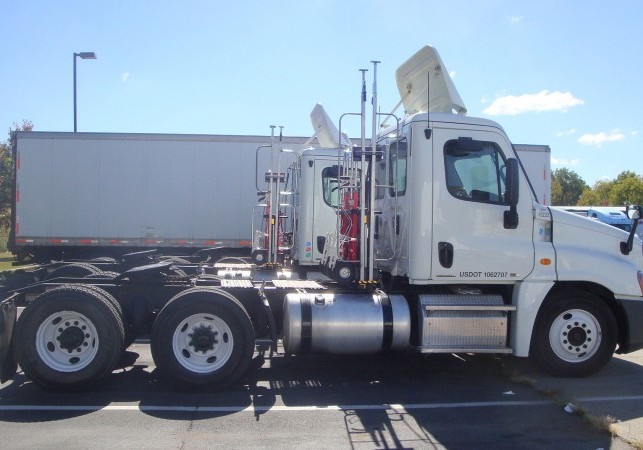Pennsylvania Trucking Industry Sues After State Regulatory Agency Adopts California Emissions Standards

A Pennsylvania administrative agency charged with regulating vehicle emissions adopted California emissions and warranty requirements for heavy-duty diesel trucks in Pennsylvania. Trucking groups have sued to block enforcement of the California regulations, which are incorporated into Pennsylvania environmental regulations on a rolling basis as the California Code is amended according to the complaint.
Luke Wake, an attorney at the Pacific Legal Foundation, which represents the plaintiffs, explained to Legal Insurrection his organization’s concerns with an administrative agency, or even the state’s legislature, using “a rolling incorporation of another state’s law”:
“It would be perfectly legal for the General Assembly to enact a statute that incorporates specific language, or even to adopt [a] regulation from another state as it exists in a specified year. . . . By contrast, when you have a rolling incorporation of another state’s law, there is a problem because you are accepting any changes they might make going forward without any idea what [you’re] getting into.”
The plaintiffs are two trucking companies, Peters Brothers and H.R. Ewell; a heavy-duty truck dealership, Transteck; and a trucking industry trade representative, the Pennsylvania Motor Truck Association.
The plaintiffs’ complaint alleges the regulations place them “at a competitive disadvantage with competitors in other states who do not have to contend with California’s unwieldy regulatory standards.”
The California Code “now imposes a schedule of progressively more stringent emission standards for Model Year 2024−2031 vehicles,” and “California’s new standards will require warranty coverage for up to 150,000, 220,000, or 450,000 miles.” For 2031 models and beyond, “California’s new standards will require coverage for up to 210,000, 280,000, or 600,000 miles.”
The defendants are the Pennsylvania Environmental Quality Board (EQB), which adopted the California regulations, the Pennsylvania Department of Environmental Protection (DEP), which enforces EQB regulations, and Richard Negrin, the Acting Secretary of the DEP.
The plaintiffs have accused the EQB of acting outside the scope of its rulemaking authority granted by the Pennsylvania General Assembly. The complaint alleges the EQB exceeded its authority to regulate “for the prevention, control, reduction and abatement of air pollution” when the agency imposed California warranty requirements on Pennsylvania vehicles.
The plaintiffs also argue the EQB’s adoption of California emissions standards is outside of the agency’s authority because California bureaucrats adopted the standards, whereas Pennsylvania law requires regulations to be “developed in consultation with the Pennsylvania Secretary of Transportation.”
The plaintiffs also accuse the EQB of violating Pennsylvania law by “fail[ing] to submit [an] analysis considering the impact of California’s new heavy diesel emission and warranty standards on Pennsylvania small businesses” and not “considering alternatives for minimizing the impact on small businesses.”
The complaint further alleges the EQB “failed to submit, to the Governor’s Office, a written attestation that California’s new heavy diesel emission and warranty standards are needed to address a compelling public need in Pennsylvania” and “failed to provide a required cost/benefit analysis of California’s new heavy diesel emission and warranty standards.”
If, however, the General Assembly did delegate the EQB the necessary rulemaking authority, the plaintiffs argue that the grant of authority was itself unlawful. The plaintiffs cite the Constitution of Pennsylvania, which states that “[t]he legislative power of this Commonwealth shall be vested in a General Assembly.”
Wake elaborated on the Pacific Legal Foundation’s concern with “an open-ended delegation” of rulemaking authority:
[W]e also take issue with an open-ended delegation that leaves the Pennsylvania Environmental Quality Board unfettered discretion to adopt California standards (or not) as it deems fit. In our system those fundamental policy decisions must be made by the Legislature—not the Executive Branch.
According to the complaint, the delegation of authority to adopt California standards is too broad, meaning the General Assembly impermissibly delegated its legislative power:
The General Assembly provided no standard guiding or restraining the Pennsylvania Board’s exercise of rulemaking discretion in deciding what conduct should be subject to regulation.
* * *
To the extent that the General Assembly delegated unfettered rulemaking authority to the Pennsylvania Board to adopt any emission and warranty standards that the Board might deem fit, it provided no standard guiding or restraining the Board’s exercise of discretion.
The plaintiffs have requested a declaration that the EQB cannot adopt “a rolling incorporation of any California law” and that the California standards adopted by the EQB “have no effect in Pennsylvania for lack of statutory authority or because imposition of new California standards violates separation of powers” and Pennslyvania regulatory and administrative law.
A representative from the DEP declined to comment on the lawsuit.
The plaintiffs have also requested the court permanently bar enforcement of the California standards in Pennsylvania and that the court award the plaintiffs costs and expenses.
The complaint:
Exhibit A, California emissions and warranty regulations:
CLICK HERE FOR FULL VERSION OF THIS STORY